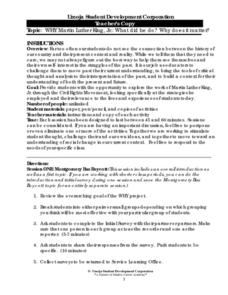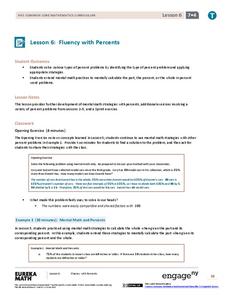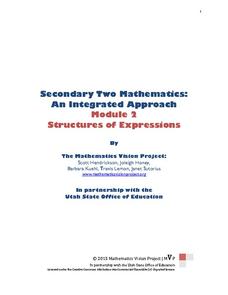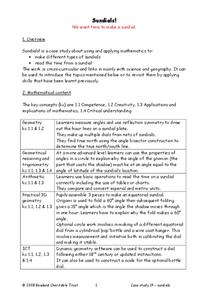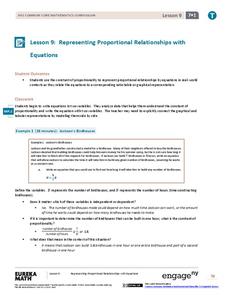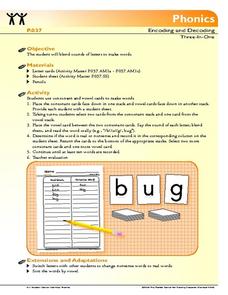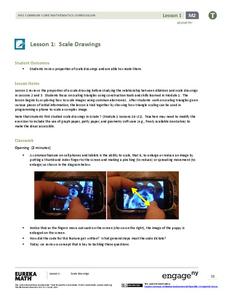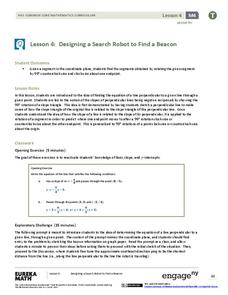Umoja Student Development Corporation
Martin Luther King, Jr.: What Did He Do? Why Does It Matter?
Young historians examine the work of Martin Luther King Jr. by reading and answering questions about the Montgomery Bus Boycott, the Albany Movement, the Birmingham and Chicago campaigns, and the Memphis Sanitation Worker's Strike....
National Museum of the American Indian
Fritz Scholder: A Study Guide
In this engaging activity involving close analysis of abstract expressionist art, your class members will not only discover more about artist Friz Scholder's Native American art, but they will also have the opportunity to consider...
Education.com
Winter Break Survival Kit
Help parents and children survive the long winter break with this collection of fun activities. Offering suggestions for volunteering during the holidays and making family New Year's resolutions, as well as a variety...
National Security Agency
Are You Game? A Lesson Connecting Fractions and Probability
Exactly how fair are the board games children grow up playing? Young mathematicians investigate this questions as they work their way through this five-lesson series on basic probability.
Rainforest Alliance
Growing a Rainforest in Our Classroom
Give your classroom decor a boost with a rainforest themed mural highlighting what class members learned through their five senses—taste, touch, see, smell, and hear. Scholars create a rainforest filled with trees and animals using their...
EngageNY
Finding Systems of Inequalities That Describe Triangular and Rectangular Regions
How do you build a polygon from an inequality? An engaging lesson plan challenges pupils to do just that. Building from the previous lesson plan in this series, learners write systems of inequalities to model rectangles, triangles,...
EngageNY
Modeling from a Sequence
Building upon previous knowledge of sequences, collaborative pairs analyze sequences to determine the type and to make predictions of future terms. The exercises build through arithmetic and geometric sequences before introducing...
EngageNY
Fluency with Percents
Pupils build confidence working with percents as they work several types of percent problems to increase their fluency. The resource contains two sets of problems specifically designed to build efficiency in finding solutions of basic...
EngageNY
Surface Area
Build upon the knowledge of nets to find the surface area of right prisms. Pupils begin to find the area of right rectangular prisms using the net for the prism. They build upon that knowledge to find a general formula that works for all...
Mathematics Vision Project
Structures of Expressions
This comprehensive unit investigates transformations of quadratics, having learners follow "Optima" through the development and growth of her quilting business. Deftly weaving the story into the mathematical mechanics, the unit gives...
Bowland
Sundials!
Time to learn about sundials. Scholars see how to build sundials after learning about Earth's rotation and its relation to time. The unit describes several different types of possible sundials, so choose the one that fits your needs — or...
Howard Hughes Medical Institute
Gorongosa: Scientific Inquiry and Data Analysis
How does the scientific process begin? Introduce ecology scholars to scientific inquiry through an insightful, data-driven lesson. Partners examine data from an ongoing research study to determine the questions it answers. The resource...
Greater Good Science Center
Discover Your Great Full Self
Reflecting on character strengths can bring a little sunshine as the gray days of winter approach. Tweens and teens view a PowerPoint presentation, watch a short video about character strengths, and take a survey that helps them identify...
EngageNY
Representing Proportional Relationships with Equations 2
Scholars determine how long it takes to build a birdhouse with the second activity on using equations with proportional relationships. The resource uses examples such as birdhouse building and produce prices to encourage pupils to write...
Florida Center for Reading Research
Phonics: Encoding and Decoding, Three-In-One
Scholars use the provided pack of alphabet cards to construct basic CVC words, then write down each word they make in one of two columns. Column one is for real words and column two is for nonsense words.
California Department of Education
Due Dates, Deadlines, and Decisions
Get high schoolers thinking about their post-secondary plans with a lesson plan that teaches them how to navigate the application and financial aid process. They create a junior/senior calendar identifying time-sensitive tasks,...
EngageNY
Scale Drawings
Are you searching for a purpose for geometric constructions? Use an engaging approach to explore dilations. Scholars create dilations using a construction method of their choice. As they build their constructed dilation, they...
EngageNY
Making Scale Drawings Using the Parallel Method
How many ways can you create a dilation? Many! Individuals strengthen their understanding of dilations by using various methods to create them. The new technique builds on pupils' understanding of the ratio method. Using the ratio,...
EngageNY
How Do Dilations Map Segments?
Do you view proofs as an essential geometric skill? The resource builds on an understanding of dilations by proving the Dilation Theorem of Segments. Pupils learn to question and verify rather than make assumptions.
EngageNY
Incredibly Useful Ratios
Start the exploration of trigonometry off right! Pupils build on their understanding of similarity in this lesson that introduces the three trigonometric ratios. They first learn to identify opposite and adjacent...
EngageNY
Sine and Cosine of Complementary Angles and Special Angles
Building trigonometric basics here will last a mathematical lifetime. Learners expand on the previous lesson in a 36-part series by examining relationships between the sine and cosine of complementary angles. They also review the...
EngageNY
Designing a Search Robot to Find a Beacon
Build right angles using coordinate geometry! Pupils explore the concept of slope related to perpendicular lines by examining 90-degree rotations of right triangles. Learners determine the slope of the hypotenuse becomes the opposite...
EngageNY
Perimeter and Area of Polygonal Regions in the Cartesian Plane
How many sides does that polygon have? Building directly from lesson number eight in this series, learners now find the area and perimeter of any polygon on the coordinate plane. They decompose the polygons into triangles and use Green's...
EngageNY
Inscribed Angle Theorem and Its Applications
Inscribed angles are central to the lesson plan. Young mathematicians build upon concepts learned in the previous lesson plan and formalize the Inscribed Angle Theorem relating inscribed and central angles. The lesson plan then guides...
Other popular searches
- Building Materials Science
- Building Materials Strength
- Earth Building Materials
- Types of Building Materials
- Earth Materials + Building
